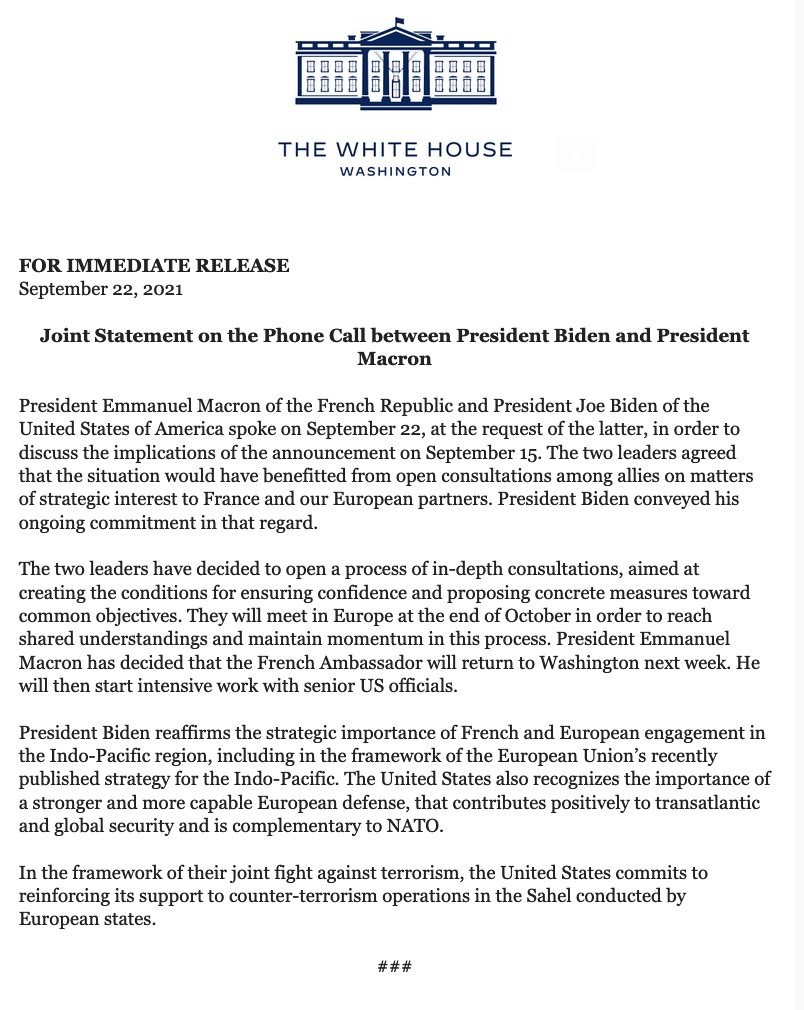
French foreign minister @JY_LeDrian testified yesterday at a French Senate hearing on the implications of #AUKUS. An important discussion with French Senators which will be followed by other hearings. A 🧵 on the main highlights 👇
https://twitter.com/Senat/status/1443253003662860292
First, minister Le Drian presented in detail the Franco-Australian Future Submarine Program. An intergovernmental agreement was signed in December 2016 and then a Strategic Partnering Agreement in February 2019.
The production was supposed to start in 2023 and the first submarine to be delivered by 2033/2034. Le Drian noted that the program included an industrial partnership with the U.S. with Lockheed Martin in charge of the weapon system.
Admittedly, challenges have been encountered but systematically overcome. On September 15 (day of the announcement of AUKUS), the French government received a confirmation from Canberra that the second phase of the program could be launched.
Then, Minister Le Drian listed the many consultations Paris had with Washington and Canberra on this specific issue over the past few months.
"At no time before 15 September did the Australians express their wish to abandon the development of Attack-class submarines or to put an end to our partnership."
Le Drian notably met with Sec. Blinken in Paris on June 25. He reminded him the importance of the submarine program for France. In response, the Secretary of State stressed that he "shared the need for a common approach and the ability of our democracies to be stronger together".
"Neither the Americans nor the British took the initiative to inform the French authorities. [...] A few hours before the announcement, the Americans finally acknowledged this information after months of deception".
AUKUS was experienced by Paris as a "betrayal by Australia and a breach of trust in the transatlantic relationship". "What is at stake is the meaning of our alliances and partnerships."
"This breach of trust calls for an examination and a rethinking of our cooperation with Australia". This also a "leap into the unknown" as Canberra has made the "choice to use a technology that it does not master and won't master in the future".
Regarding the United States, initial commitments have been made by President Biden. However, "the crisis is serious and is not over simply because dialogue has been resumed. Coming out of it will require strong actions rather than words".
"As for the British, the ball is now in their court if they want us to move forward and regain some form of trust. This is what the President has indicated very firmly to the British Prime Minister. But before anything else, we will have to review our relationship".
AUKUS "will not affect our determination to remain engaged in the region". France will continue to promote a "path that, while fully assuming the game of power, including military power [with Beijing], does fuel tensions and conflict".
"AUKUS is in fact the name of a new military alliance and an alignment on a logic that systematizes confrontation."
France "assumes the competition with China" but seeks to build "an alternative model to the Chinese model with all the players in the Indo-Pacific". Le Drian notably mentions his recent meetings with his Indian, Indonesian and Japanese counterparts.
Paris will continue to "promote multilateralism" across the region to "show in all areas - maritime security, connectivity, environmental protection, trade, freedom of navigation - that another way is possible".
France will also accelerate the implementation of the European Indo-Pacific strategy which will be one of the priorities of the French Presidency of the EU next year.
"We cannot turn our back on a region where European interests are at stake. We will have a dedicated ministerial meeting on the Indo-Pacific with our partners in the region during our Presidency."
As the U.S. redefines and narrows its fundamental interests, Europeans "need to give themselves the means to act autonomously. Otherwise, we would be in a position of vulnerability or powerlessness".
"The future of the transatlantic alliance also depends on this rebalancing and these strengthened ties between Europeans and Americans."
"Leaving NATO is out of question". On the contrary, France is strongly committed to the "review of NATO's strategic concept". Besides, this crisis does not call into question U.S. commitment to article 5 and "NATO's core business, ie collective defense". [End]
“Does NOT fuel tensions and conflict”
• • •
Missing some Tweet in this thread? You can try to
force a refresh




